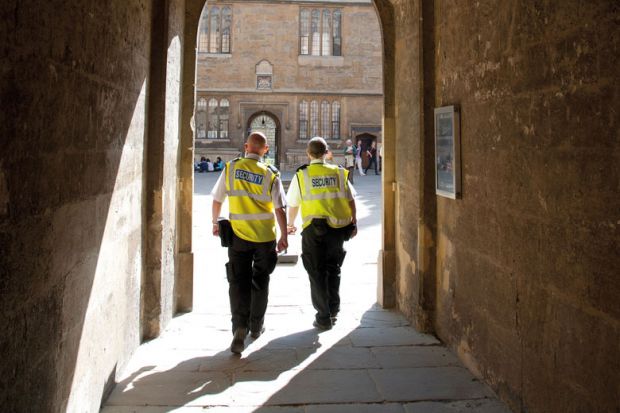In the 21st century, working in university security requires people who can think on the spot and act swiftly. But more than that, it is about adaptability, according to Oliver Curran, who has spent 27 years in the business.
“A good security officer is like a Swiss army knife. When they turn up at that unwanted situation, they’re able to deal with what’s in front of them,” he said.
Mr Curran, who for the past 15 years has been an in-house security manager in higher education and is currently at UCL, recently began his tenure as chair of the Association of University Chief Security Officers (AUCSO), which represents 220 institutions globally, roughly half of them in the UK.
His job, like his organisation, sits between two industries that don’t usually brush shoulders: security and higher education. A big part of his role is explaining what he and his peers do to those from either group.
“My two-year stint is very much about trying to…get people to understand it,” he said.
While security officers usually have a low profile, they gained an unexpected reputation boost during the pandemic, when faculty and students realised that “this crowd’s quite useful”, he said. Even as campuses emptied out, “we didn’t go home – we were still there, watering the plants” and maintaining a familiar presence.
Though many institutions see the value of their security teams and recognise these staff as valuable members of the community, Mr Curran said, not all of his colleagues are made to feel this way.
“Some are forgotten about,” he said. “We’re seen as that grudge spend.”
Such attitudes have led to many security staff changing their titles in recent years. “Ten years ago we were ‘security guards’, then we were ‘security officers’. Now you have ‘campus officers’…and ‘campus support’.”
Regardless of the title, Mr Curran wants the public to know that security is about much more than chasing down thieves.
“People don’t realise what a lot of training university security have and what that can bring to an institution,” he said. “We work in an environment where sometimes you don’t have a first-aider, so we send our staff.”
Security officers are also frequently the first port of call when there’s a fire and in situations where there are mental health concerns surrounding students. AUCSO is trying to incorporate more training, such as one course put together by an ex-military medic on dealing with trauma. According to Mr Curran, this is especially valuable for smaller institutions, which have fewer staff and available resources.
Still, traditional security concerns remain a large part of the job, with theft one of the main crimes that gets reported to his team at UCL.
“Most of the time when we speak to students, it is about something being stolen,” he said.
Students are an “especially attractive” target from a criminal’s point of view. They’re highly mobile and carry lots of lightweight valuables – phones, bikes, bags – which they often leave unlocked and unattended. At the chaotic beginning and end of the academic year, during move-in and move-out time, crime peaks. His team records a handful of thefts each month, despite frequent precautionary messages to students. Still, that number has stayed “quite flat” over the past decade, despite the fact that student numbers have grown significantly.
But, in other ways, crime is up. In the past few years, he’s seen a surge in fraud – with more vulnerable overseas students often the targets. At UCL, Chinese students would get phone calls from representatives claiming to work for the Chinese consulate saying they needed to make bank transfers. Often, Mr Curran and his team would hear about it when it was too late.
“It’s heartbreaking,” he said. “They turn up and have all this money to get them through the next few years and it’s gone, and then they have to go back. We say ‘question everything; if you’re unsure, call us’.”
In the day-to-day, security is often about supporting individual students, but Mr Curran also has big-picture concerns, such as ensuring his institution is prepared to respond to terrorist attacks. Going forward, he’s working on putting in place campus security plans for Martyn’s Law, named after Martyn Hett, who was killed with 21 others in the 2017 Manchester Arena bombing. Currently in development, it tackles security preparedness against terrorism, requiring venues to put in place safety plans.
Together with the Department for Education, the Home Office and the UK’s counter-terrorism and security office, AUCSO is consulting on plans, evaluating how various campus venues – such as lecture theatres and dormitories – fit into the picture.
While he sees it as his “biggest challenge” as chair over the coming two years, Mr Curran said he welcomed the push from policymakers.
“Why do people take health and safety so seriously?” he asked. “Because there’s a law, a fine. We don’t have that in security.”
Register to continue
Why register?
- Registration is free and only takes a moment
- Once registered, you can read 3 articles a month
- Sign up for our newsletter
Subscribe
Or subscribe for unlimited access to:
- Unlimited access to news, views, insights & reviews
- Digital editions
- Digital access to THE’s university and college rankings analysis
Already registered or a current subscriber? Login








